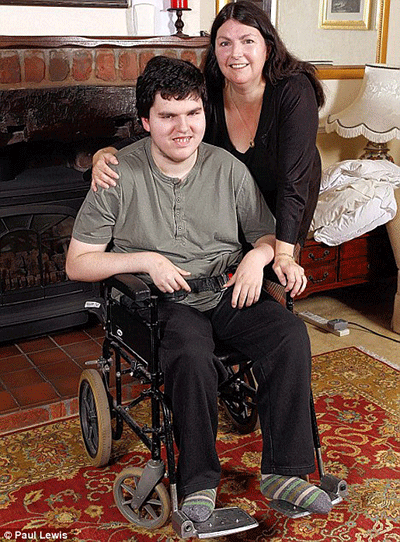Population studies on autism rates will never uncover possible links to vaccines.
That’s the view of Jackie Fletcher, founder of UK support group Justice, Awareness and Basic Support (JABS).

Jackie Fletcher with son Robert, who was left brain damaged by the MMR vaccine
Fletcher made the comments after a population study by Danish researchers dismissed links to the measles, mumps and rubella (MMR) vaccine.
Dr Anders Hviid, of Copenhagen’s Statens Serum Institut, led the scientists. They found their research “strongly supports that MMR vaccination does not increase the risk for autism”.
Nor does it trigger the condition in susceptible children, say the scientists.
Vaccines ‘not linked to clustering of cases’
They also suggest there is no link between vaccines and a clustering of autism cases after vaccination.
The research defined susceptible children as those with siblings with the condition.
The scientists also used as risk factors the age of the parents, smoking during pregnancy, premature birth and low birthweight.
The work looked at Danish children born between 1 January 1999 and 31 December 2010.
‘Look at individual case histories’
But Fletcher believes scientists should look at the individual case histories of children whose parents say they were vaccine damaged.
Fletcher’s group supports families who believe that vaccinations have harmed their children.
A medical assessment panel ruled that the MMR vaccine caused brain damage to Fletcher’s own son, 27-year-old Robert. The panel awarded her and husband John £90,000.
Fletcher said: “Unless you’re going to actually do case studies and study individual people it’s hardly likely to find the link that parents are reporting to us.”
Leading US paediatric neurologist Dr Andrew Zimmerman has said he believes vaccines can cause autism in a subset of children with a mitochondrial disorder.
The Danish study did not look at children with a mitochondrial disorder.
Related:
- Vaccines fight ‘may have big impact’
- Lawyer calls for new probe into vaccines
- Doctor says vaccines may cause autism
- Vaccine pollutants ‘cause disease’
Published: 24 March 2019















